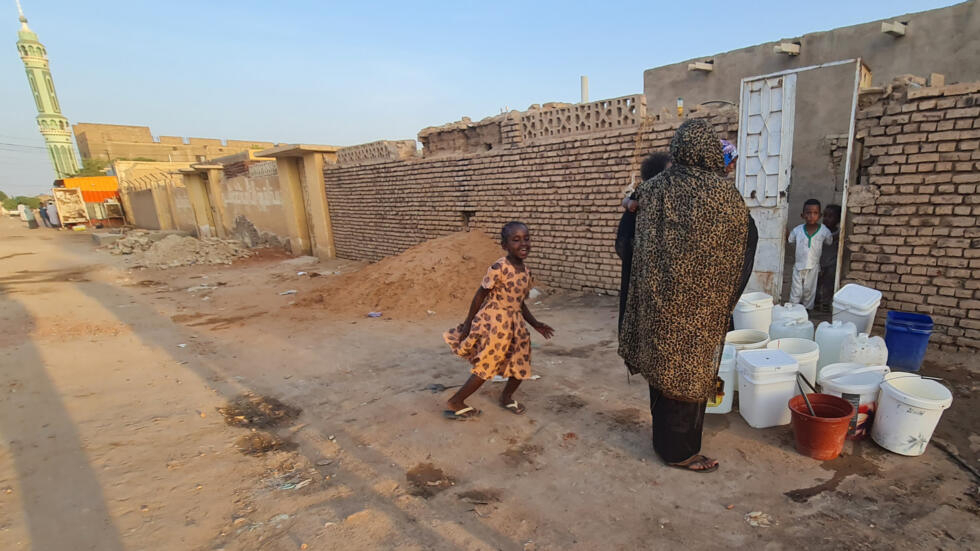Khartoum (AFP) – Fighting on Sunday between rival Sudanese generals in Darfur killed at least a dozen civilians, said a doctor in the devastated region.
Speaking from the capital of South Darfur state, the doctor said fighting there had led to “a provisional toll of 12 civilians killed in Nyala”.
But the source — speaking anonymously for security reasons — noted that “the violence of the fighting restricts movement” of victims to hospital.
Residents on Saturday had reported battles, shelling and artillery strikes in Nyala.
Darfur, a vast western region on the border with Chad, has witnessed the deadliest violence in the battle for power between army chief Abdel Fattah al-Burhan and his former deputy, Rapid Support Forces paramilitary commander Mohamed Hamdan Daglo.
The United Nations says violence in Darfur has taken an “ethnic dimension” and could constitute “crimes against humanity”.
Daglo’s RSF have their origins in the Janjaweed militias which former strongman Omar al-Bashir unleashed in response to a rebellion by ethnic minorities in Darfur in 2003, drawing charges of genocide, war crimes and crimes against humanity.
Nearly 2,800 people have been killed in Sudan since battles began in the capital Khartoum on April 15, according to a new toll from the Armed Conflict Location and Event Data Project.
Almost two million others have been displaced within the country, and roughly 600,000 have fled over Sudan’s borders, the International Organization for Migration said.
The UN on Saturday urged “immediate action” to stop the killings of people fleeing El Geneina, the West Darfur state capital, by Arab militias aided by the paramilitaries.
Up to 1,100 people have been killed in El Geneina, the United States State Department said in mid-June.
Bodies have been left lying in the streets, including several that appeared to be face down together on a dirt road. Shops have been ripped open by looters.
‘Rockets are falling’
In the chaos, families try to avoid bullets on the 30-kilometre (18-mile) journey to neighbouring Chad — where more than 155,000 have taken refuge.
Across the border in Adre, refugees gather under tarpaulins stretched over branches, and form long lines to collect food and water.
Aid has reached at least 2.8 million people in Sudan, the UN said, but agencies report major hurdles to their work, from visas for foreign humanitarians to securing safe corridors.
But the source — speaking anonymously for security reasons — noted that “the violence of the fighting restricts movement” of victims to hospital.
Residents on Saturday had reported battles, shelling and artillery strikes in Nyala.
Darfur, a vast western region on the border with Chad, has witnessed the deadliest violence in the battle for power between army chief Abdel Fattah al-Burhan and his former deputy, Rapid Support Forces paramilitary commander Mohamed Hamdan Daglo.
The United Nations says violence in Darfur has taken an “ethnic dimension” and could constitute “crimes against humanity”.
Daglo’s RSF have their origins in the Janjaweed militias which former strongman Omar al-Bashir unleashed in response to a rebellion by ethnic minorities in Darfur in 2003, drawing charges of genocide, war crimes and crimes against humanity.
Nearly 2,800 people have been killed in Sudan since battles began in the capital Khartoum on April 15, according to a new toll from the Armed Conflict Location and Event Data Project.
Almost two million others have been displaced within the country, and roughly 600,000 have fled over Sudan’s borders, the International Organization for Migration said.
The UN on Saturday urged “immediate action” to stop the killings of people fleeing El Geneina, the West Darfur state capital, by Arab militias aided by the paramilitaries.
Up to 1,100 people have been killed in El Geneina, the United States State Department said in mid-June.
Bodies have been left lying in the streets, including several that appeared to be face down together on a dirt road. Shops have been ripped open by looters.
‘Rockets are falling’
In the chaos, families try to avoid bullets on the 30-kilometre (18-mile) journey to neighbouring Chad — where more than 155,000 have taken refuge.
Across the border in Adre, refugees gather under tarpaulins stretched over branches, and form long lines to collect food and water.
Aid has reached at least 2.8 million people in Sudan, the UN said, but agencies report major hurdles to their work, from visas for foreign humanitarians to securing safe corridors.
International donors pledged $1.5 billion in aid at a conference in Geneva last week — less than half the estimated needs for Sudan and its affected neighbours.
The United States, which along with Saudi Arabia sought to mediate between the warring sides and ensure humanitarian aid can reach those in need, said Thursday it had put its efforts on hold.
Outside of Darfur, the capital Khartoum has been the war’s main battleground. The armed forces have stepped up air raids there, while RSF artillery targets army and police bases.
Residents who remain in the city are suffering electricity and water shortages.
On Sunday, several of them reported artillery fire in the south of the city, and fighting elsewhere.
“Rockets are falling on the houses,” a witness in Khartoum’s twin city of Omdurman told AFP.
International donors pledged $1.5 billion in aid at a conference in Geneva last week — less than half the estimated needs for Sudan and its affected neighbours.
The United States, which along with Saudi Arabia sought to mediate between the warring sides and ensure humanitarian aid can reach those in need, said Thursday it had put its efforts on hold.
Outside of Darfur, the capital Khartoum has been the war’s main battleground. The armed forces have stepped up air raids there, while RSF artillery targets army and police bases.
Residents who remain in the city are suffering electricity and water shortages.
On Sunday, several of them reported artillery fire in the south of the city, and fighting elsewhere.
“Rockets are falling on the houses,” a witness in Khartoum’s twin city of Omdurman told AFP.



